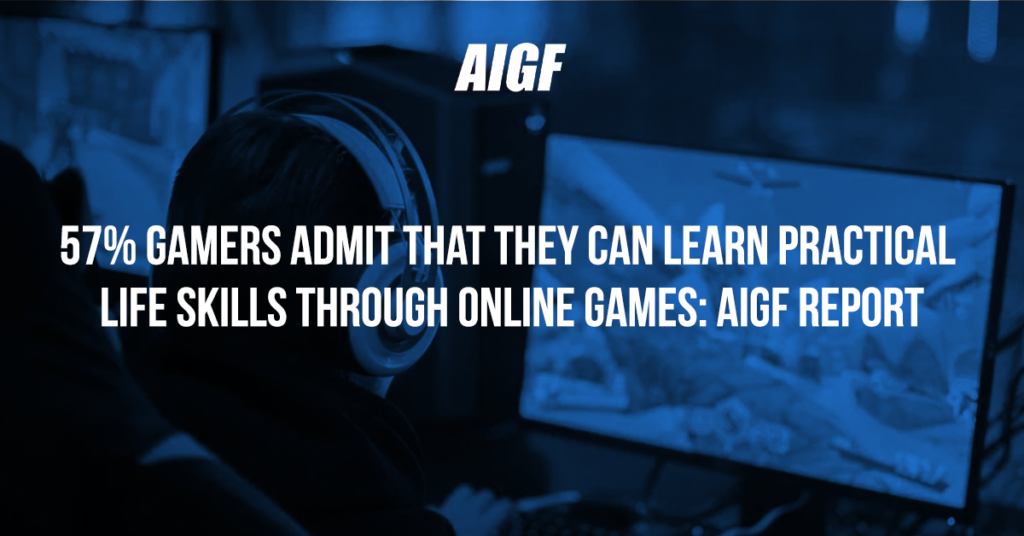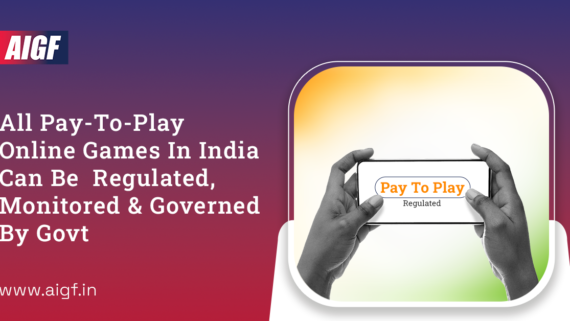India recorded around 365 million online gamers in the financial year 2020. This number is expected to reach up to 510 million by the year 2022. In India, the business developed at a CAGR of 21% during the lockdown, with a consistently expanding customer base.
57% Gamers Admit That They Can Learn Practical Life Skills Through Online Games: AIGF Report
The Internet has changed our lives into a digital living space. As the years are passing by we are growing increasingly dependent on the Internet for our day to day activities. As of January 2021, 624.0 million users are there in India, and India is set to reach one billion internet users by 2025 & the country’s smartphone base is anticipated to reach 820 million in the following two years. As the quantity of smartphone users is on the rise, it is bringing about a gigantic leap in the number of Indian gamers as per AIGF recent report Online Gaming is a Life Skill.
India recorded around 365 million online gamers in the financial year 2020. This number is expected to reach up to 510 million by the year 2022. In India, the business developed at a CAGR of 21% during the lockdown, with a consistently expanding customer base. The report additionally tried to focus on which abilities were considered ‘fundamental abilities’ by gamers, how gamers established such abilities, regardless of whether the working environment adequately taught them such abilities, and which of these abilities could be mastered through gaming.
All India Gaming Federation CEO Roland Landers said, “Varied skills like critical thinking, creative thinking, decision making and problem-solving are essential for one’s growth in life. Through this research, we sought to understand whether consumers genuinely realise the value of mobile gaming. This study has helped us conclude that gaming is a way to collaborate, engage, and it is becoming a sector where people want to build their careers.”
Here are the key discoveries:
- 26% of people shared that online games can be considered a stress buster for them. While 24% of the people consider online to be means to earn money, one of every seven respondents (13%) accept that online gaming can show people some significant abilities and improve their intellectual capacity and skills.
- More than 3/4 of the people, 76%, concede that Online gamers’ increase in solid logical abilities is consistently attempting to evaluate the most ideal approach to dominate a match.
- 63% of people view the self as ‘discipline’ as a fundamental ability and the greater part of someone’s life, which is 53%, accept that ‘determination’ is significant expertise for an online gamer.
- Also, analytical reasoning and critical thinking are fundamental abilities for 55% of gamers and a corresponding 68% of respondents accept that logical ability and decision making are fundamental for playing online games.
- Another Consideration of this pattern is the number of people who consider ‘hand-eye coordination’ as a fundamental ability (58%) and the individuals who accept ‘reflexes’ are important for Online gamers (65%).
- The Most Interesting Part about Online Games is that 57% admit that an individual can learn numerous things and fundamental abilities through online games that they might learn in their workplace or office. Truth be told, more than one-third of the people who are in gaming, 38%, feel the interesting part of Online gaming helps them to experience real-time experiences.
- People are more inclined to be more legit with their online gaming partners than with their office associates. as it is noticed that it might be seen consistently that 56% when people are playing online games are more inclined towards teamwork rather than working in the office sector.
- 69% of GenX are self-disciplined followed by recent millennials at 64%, over 45 years at 61%, and GenX 58%.
- 59% of GenX, 58% GenZ, 57% over 45 years, and 58% recent college grads accepted that hand-eye coordination is really important for gaming.
- 57% of recent college grads have logical abilities followed by GenZ at 56%, GenX at 55%, and above 45 years at 50%.
- 52% of Gen Z have a capability of risk/opportunity, trailed by 48% of recent college grads, 41% of Gen X, 42% over 45 years.
- 43% of Gen Z and 41 percent recent college grads, which is almost double of those who are over 45 years (25 percent), accept that friendship/connections made online between gamers can be just about as significant as real friendships.
- 77% of men and 75 percent of ladies agree that abilities obtained through online gaming are adaptable to real life, and they get to learn alit from the strategies making and increasing mental stability in real-life circumstances.
- 51% of women accept that physical and mental abilities like ‘memory’ and ‘reflexes’ are fundamental for online gamers (and with 33% men), more than 66% of men (67%) accept that psychological abilities like strategy, logic, understanding the scenario at the given moment and assurance are requirements for online gamers (compared with 49% of women).
- 43 percent of women and 55 percent of men would be totally honest while teaming up with a partner while playing an online game compared with the greater part the women (53%) and 50 percent men would tell the truth to their work associates consistently.
- Mobile gamers have obviously outsourced the number of PC or console gamers, with just 12% Indians playing games on the console and mainly 67% of Indians playing on smartphones and tablets.
- 70 percent of people claim that mobile phones are the source through which they can play mobile games easily can earn money also through their smartphones.
At the Survey when it is asked which are the skills you pot when you play Online Games then these were their answers:
Right now fixed at $1.2 billion (end-2020), India’s mobile gaming market is expected to grow to $1.6 billion in 2025.
Gen Z basically comes in the time where the digital transformation is on the up move, and it is the most optimal with the mobile phones with the purpose(73%) while those over 45 years are the least comfortable(66%).
Credits: Animation Xpress











Comments
Comments are closed.